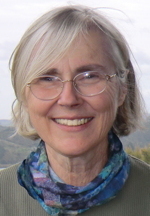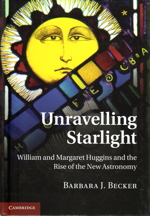You are here
2015 Osterbrock Book Prize Winner - Barbara J. Becker
Barbara J. Becker Awarded the 2015 Donald E. Osterbrock Book Prize for Unravelling Starlight
by Jay M. Pasachoff
 The Historical Astronomy Division is pleased to announce the award of its Donald E. Osterbrock Book Prize for 2015 to Barbara J. Becker, for Unravelling Starlight: William and Margaret Huggins and the Rise of the New Astronomy (Cambridge University Press, 2011). Dr. Becker taught history of science at the University of California, Irvine, and is now retired and living in North Carolina.
The Historical Astronomy Division is pleased to announce the award of its Donald E. Osterbrock Book Prize for 2015 to Barbara J. Becker, for Unravelling Starlight: William and Margaret Huggins and the Rise of the New Astronomy (Cambridge University Press, 2011). Dr. Becker taught history of science at the University of California, Irvine, and is now retired and living in North Carolina.
Becker has studied William and Margaret Huggins for decades, and the culmination of her detailed archival work is Unravelling Starlight, an invaluable analysis of the roles of these pioneers in astrophysics. The Hugginses were active in England in the late 19th century at a time when merely measuring the positions and brightnesses of stars and planets was widely considered the proper role of astronomers; their emphasis on the new technique of spectroscopy was a key ingredient in the birth of what came to be called astrophysics.
 William Huggins, a former London silk merchant, was a prime example of a Victorian "amateur" astronomer who made fundamental contributions to the field. From his home in a London suburb he observed for decades, at first visually and then photographically, the spectra of stars and nebulae.
William Huggins, a former London silk merchant, was a prime example of a Victorian "amateur" astronomer who made fundamental contributions to the field. From his home in a London suburb he observed for decades, at first visually and then photographically, the spectra of stars and nebulae.
Huggins was the first to observe emission lines in the spectra of some nebulae (e.g., planetary nebulae), thereby suggesting their gaseous nature (by comparison with laboratory spectra), and he found no emission lines in others (e.g., globular clusters, the Andromeda nebula and its companion). Huggins was also the first to apply Christian Doppler's principle to shifts in wavelength of a star's light (Sirius) in order to determine its motion along the line of sight.
Becker's double biography also reveals new insights regarding the under-appreciated role of Margaret Huggins in all aspects of the work after 1875. She was especially skilled in photographic techniques and, rather than a mere "Assistant," she was a true collaborator.
Another of Becker's new insights is how thoroughly the Hugginses were involved in solar observations, in particular suggesting plausible methods of observing solar prominences and photographing the solar corona without a total eclipse.
Since the publication of her prize-winning book, Becker has also compiled the Selected Correspondence of William Huggins (Pickering & Chatto, 2014).
Unravelling Starlight: Publisher’s description; Reviews
